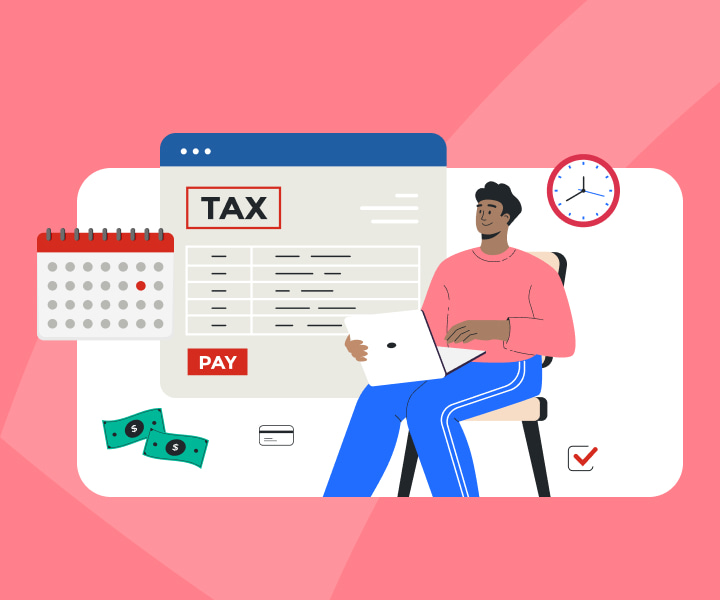Get all the expert help you need for only $20 when you’re 25 or younger with TurboTax
How Much Tax Do You Need to Pay on Part-Time Jobs?
TurboTax Canada
December 20, 2023 | 4 Min Read
Updated for tax year 2025

So, here’s the thing: We all pay taxes on income earned. And whether you’re a full-time student looking for a bit of pocket change, or you carry a full-time job and want something extra, you’ll pay taxes on the income you earn from a part-time job.
Your life is busy enough and the last thing you probably want to do is figure out taxes for your part-time job. We’ve got you covered, though, so there’s no reason to feel overwhelmed. This article is here to help you understand taxes on part-time jobs—giving you tips to make the process easy and stress-free, while maximizing your take-home pay.
Key Takeaways
- If part-time job earnings total less than the basic personal amount, you may be entitled to a refund of taxes paid.
- You must pay taxes on all income earned, including tips and cash transactions.
- There is no separate tax for part-time workers or students.
What are the rules around part-time jobs and taxes?
All employment earnings—even tips and cash transactions—must be reported on your income tax return. It doesn’t matter if you worked a little or a lot, part time or full time. That’s why it’s important to keep complete and accurate records of all income you received.
Everyone’s tax situation is specific to them, however, and the amount of income taxes due are based on your income tier. This means that sometimes you can end up getting a refund of everything you paid through the part-time employer, and sometimes you discover you haven’t paid enough.
Why do I have to pay taxes on a part-time job?
Income taxes are mandatory and required by all individuals and businesses. The income taxes you pay help the government provide services, such as health care and education.
When you work for an employer even in a part-time capacity, specific deductions are withheld from each paycheque. This may in turn qualify you for certain federal or provincial/territorial credits and benefits—such as tuition tax credits, charitable donation credits, or Canada child benefits—and possibly resulting in a refund of the taxes withheld.
How do I pay taxes on my part-time job?
When you work part-time, taxes are automatically deducted from your paycheque by your employer, just as they are with a full-time job. As part of your initial employment paperwork when you start a new part- or full-time job, you’ll fill out a Form TD1.
This form is a personalized tax credits return, on which you provide your best estimate of your current tax situation. Your employer then uses that form to calculate how much income tax to withhold from each paycheque.
How much tax is deducted from my part-time paycheque in Canada?
The amount of income tax that’s deducted from your pay depends on the information you provide on your TD1 Personal Tax Credits Return. This return asks for several details about your personal tax circumstances, including:
- Whether you pay tuition fees as a full- or part-time student
- Whether you have a spouse
- Whether you have children
- Your expected basic personal amount
In 2025, a single full-time student who earns less than $177,882 has a basic personal amount of $16,129. Since their school tuition is likely more than $100, they would include the total expected tuition amount on this form as well. The student’s employer would use the total of these to determine how much tax to deduct from each paycheque.
A student who is married and has one child, however, would have a different level of taxes deducted because they have different income levels, allowances, and credits calculated on their TD1 form.
Do I still have to pay taxes if I’m a student with a part-time job?
Yes, everyone who earns income pays income taxes. Being a student does not release you from that obligation. However, there are common circumstances which allow you to receive that money back.
Part-time jobs sometimes do not last the entire year, or they don’t provide enough hours for reasonable earnings. In these cases, you may not earn enough for the tax withholdings to be more than the basic personal amount on your income tax return.
It’s a little like having a secret savings account actually, because when this happens, you’ll receive the overpayment returned to you as a tax refund.
Does how much I earn part-time in Canada affect my taxes?
Yes. Even if you work part time while attending school, the amount of money you make is what matters, not the part-time work status.
In Canada, income tax percentages are broken into brackets, with the lowest at 15%. As of 2025, if your total income exceeds $57,375 then your tax deduction will increase to 20.5% on income above that level. These brackets, or tax tiers, increase as your income increases, again, regardless of whether you work a part-time or full-time job.
Let’s look at a couple of fictitious scenarios:
- You’re a full-time student working and earn $12,000 through your part time job. Since you earned less than the basic personal amount of $16,129, you will receive an income tax refund.
- You’re a part-time student with a full-time job, that earns $57,375. You take on a part-time job which earns an additional $12,000. This means 20.5% of the $12,000 is due as federal tax. If your employer only withheld 15% because the pay was below the basic personal amount level, you will likely have a balance due when you file taxes.
Now you know how part-time jobs affect your taxes
To summarize: Part-time income tax obligations are the same as full-time. Whether you’re working seasonally, part time while attending school, or to supplement your income, you’re required to track and report income from that extra job. Depending on how much money you make, though, you may be able to receive all or some of that money back, in the form of an income tax refund.
What are the rules around part-time jobs and taxes?
Why do I have to pay taxes on a part-time job?
How do I pay taxes on my part-time job?
How much tax is deducted from my part-time paycheque in Canada?
Do I still have to pay taxes if I’m a student with a part-time job?
Related articles

© 1997-2024 Intuit, Inc. All rights reserved. Intuit, QuickBooks, QB, TurboTax, Profile, and Mint are registered trademarks of Intuit Inc. Terms and conditions, features, support, pricing, and service options subject to change without notice.
Copyright © Intuit Canada ULC, 2024. All rights reserved.
The views expressed on this site are intended to provide generalized financial information designed to educate a broad segment of the public; it does not give personalized tax, investment, legal, or other business and professional advice. Before taking any action, you should always seek the assistance of a professional who knows your particular situation for advice on taxes, your investments, the law, or any other business and professional matters that affect you and/or your business.









